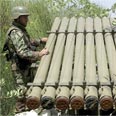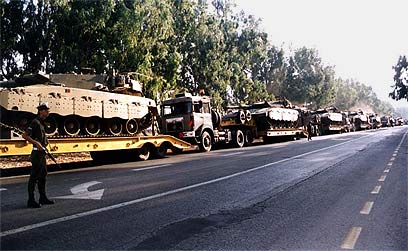
Operation Accountability (1993)
None
Operation Accountability was a seven-day military campaign mounted by the Israeli Defense Forces in July 1993, in southern Lebanon. The operation was meant to curb Hizbullah rocket fire on the northern Israeli communities adjacent to the Israel-Lebanon border.
In January of 1985, Israel gradually withdrew from all of the Lebanese territories it had taken during the 1982 Lebanon War. Israel and the South Lebanon Army (SLA) maintained control of a narrow buffer zone between the two countries, meant to allow Israel to maintain the security of the communities along the borderline and prevent any Katyusha fire or terror attacks by Hizbullah.
The 15 years which followed saw daily clashes between IDF and SLA forces and Hizbullah operatives, in and northern of the security buffer zone. The IDF's clear technological superiority helped the Israeli forces thwart many of the threats, but the Israeli military was unable to definitively crush the Shiite guerilla group, thus failing to put a complete stop to the incessant Katyusha fire on the northern communities.

IDF tanks making their way to Lebanon (Photo: Amikam Horesh)
Spring of 1993 saw the rocket fire emanating from Hizbullah hubs along the Lebanese side of the border worsen, as did the clashes between IDF forces and Hizbullah operatives.
The constant disruption of normal life in Israel's north and the escalating numbers of IDF fatalities, eventually prompted then-Prime Minister Yitzhak Rabin to order the launch of a large-scale military campaign.
Operation Accountability began on July 25, 1993, with Air Force fighter jets shelling known terror hubs in south Lebanon. Then-IDF Chief Ehud Barak ordered his ground troops to direct massive artillery fire at the area, with the aim of driving the civilian population away – a move he believed would translate into pressure on both the Lebanese and Syrian governments to curb Hizbullah activity.
The operation severely damaged Lebanon's civilian infrastructure, driving tens of thousands of people north of the area, effectively rendering them refugees; and making Israel the focal oh harsh international criticism.
The shelling was met with heavy Katyusha fire on the north, which resulted in two Israeli civilians dead and 13 injured.
One week into the fighting, the United States was able to broker a ceasefire between Israel, Syria, Lebanon and Hizbullah. The series of armistice understandings negotiated included Lebanon and Syria pledging to curb Hizbullah activities in their respective territories; and Israel pledging not to launch any military incursions deep into Lebanon and to allow the Lebanese refuges safe passage back to their homes.
The parties further agreed that should Hizbullah resume its fire on Israel, the latter will be entitled to retaliate using any means at its disposal. The US and several Arab nations pledged to aid Lebanon in rebuilding the infrastructure destroyed during the operation.
The IDF suffered one fatality and three casualties during Operation Accountability.
The ceasefire agreement signed at the end of the military campaign was short-lived, as increasing Hizbullah aggression over the three years to follow, would eventually force Israel to launch Operation Grapes of Wrath.










